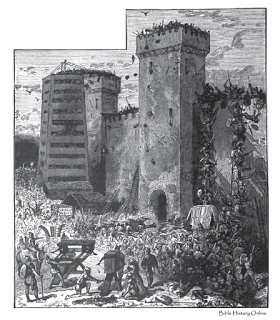 |
| Trying to “win” a strong city |
I like this imagery a lot. It applies pretty well to discussions of Book of Mormon historicity, where people have different ideas.
The proverb can be taken at least two ways.
1. It could mean that if you want to “win” someone, don’t offend them.
2. And it could mean that the type of people who get offended are like strong cities.
_____
The adjective “strong” denotes effective protection and defenses. A strong city, like the one in the image on the left here, is designed to prevent outsiders from entering.
As applied to a person, the metaphor of a strong city effectively describes people who get offended. They are inherently defensive, erecting walls against criticism and facts and arguments that contradict their comfortable beliefs.
Hmm, that sounds a lot like the M2C intellectuals I’ve been discussing on this blog…
Another term for such a city is a bubble. A bubble defined by people who get offended, or any of the synonyms: upset, hurt, wounded, injured, insulted, aggrieved, affronted, pained, displeased, distressed, disgruntled, put out, annoyed, angered, angry, cross, exasperated, indignant, irritated, vexed, piqued, irked, stung, galled, nettled, needled, peeved, ruffled, resentful, in a huff, huffy, in high dudgeon, fed up…
_____
I don’t understand the rationale for taking offense anyway. If someone says something that contradicts your self-image or your ideas, it’s either true or not. Either way, how could it be offensive?
Brigham Young reportedly said said that he who takes offense when no offense was intended is a fool, and he who takes offense when offense was intended is usually a fool.
That’s advice that, had it been added to Proverbs and heeded by Bible readers, would have eliminated untold contention and conflicts in the world–and in the Church.
_____
In the context of academic or scholarly debates over facts and reason and rational argument, the whole idea of taking offense is bewildering. These are conceptual issues that represent different interpretations of reality. Anyone should be able to assess them analytically, particularly in an academic context.
And yet, since I’ve been looking at the issues I address in this blog, I’ve encountered plenty of intellectuals who seem more eager to take offense and claim to be insulted than they are to consider alternative perspectives and discuss them.
Their utmost priority is censorship of ideas they disagree with.
Which reminds me of another verse from Proverbs 18:13 “He that answereth a matter before he heareth it, it is folly and shame unto him.”
_____
Maybe the strong city considers itself open-minded. The predominant feature of the city is that it is strong; i.e., safe. Not closed-minded, but simply secure.
As evidence, it points to the drawbridge that allows people to come and go. Of course, it’s a draw bridge; it can be drawn up to prevent people from entering if they don’t who fit into the city’s society, as determined by the city’s leaders.
IOW, only people and ideas that confirm the biases of the city’s leaders–in this case, the M2C citation cartel.
_____
Now, look at the proverb from the other perspective; i.e., if you want to “win” someone, don’t offend them.
This is the ideal scenario. You share a new idea, perspective or set of facts with someone in a loving and respectful way and they promptly accept it. They collaborate with you and you adjust your own thinking as everyone works together to improve our mutual understanding. Everyone reaches consensus. Everyone aligns with the prophets. Everyone is happy and united and moving upward and onward.
Everything is awesome.
Oh, and your colleagues are thrilled to reject everything they’ve written and taught throughout their careers. They explain to donors that they’re reworking everything. They issue an apology to thousands of students for having misled them, albeit with the best of intentions.
And then you awaken from your dream and think, if not for human nature, this could really happen.
Source: Book of Mormon Wars

3 thoughts on “Proverbs 18 – a brother offended”
Why does “many waters” mean lakes in Mormon 6:4 and the oceans everywhere else in the Book Of Mormon?
You’re referring to modern nomenclature. Anciently, the Hebrew term for “sea” meant any large body of water, including the Indian Ocean, the Red Sea, the Mediterranean Sea, the Sea of Galilee, and the Nile River.
The “Sea” of Galilee is only 166 square kilometers (km2). By comparison, “Lake” Cayuga is 172 km2–even larger than the “Sea” of Galilee. “Lake” Seneca is 277 km2. “Lake” Ontario is 18,960 km2, and “Lake” Erie is 25,744 km2.
Today, we still call it the Sea of Galilee because of ancient tradition. If we applied ancient concepts, the bodies of water around Cumorah would also be called seas.
Often those who are offended sought the offense in the first place as an excuse to act and behave the way they desire to act and behave.
Comments are closed.